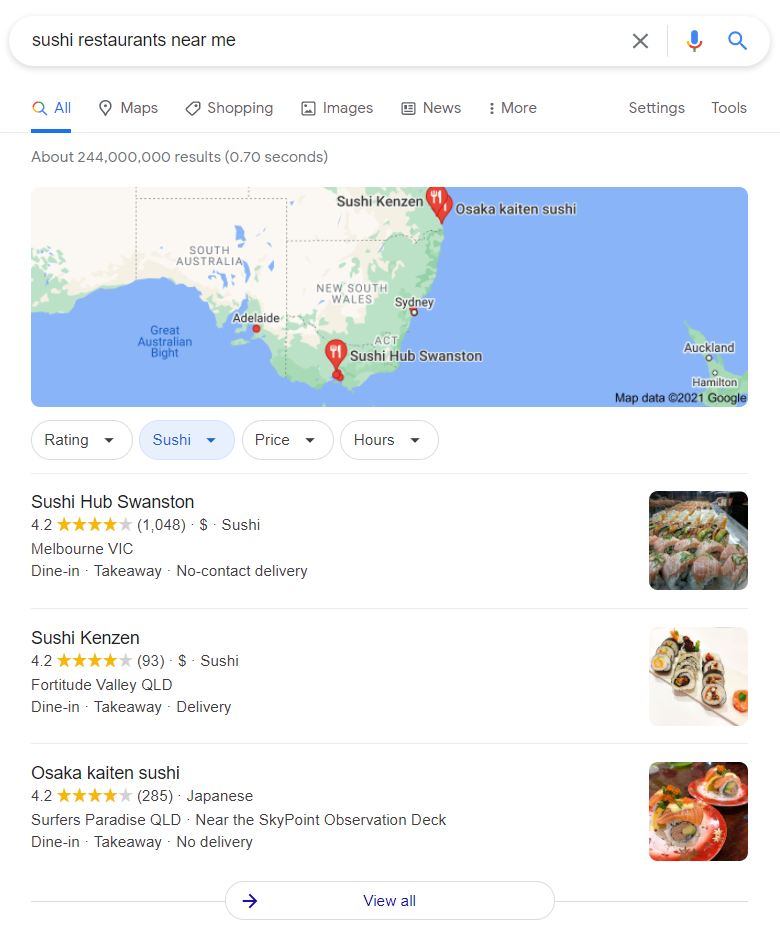With the help of smartphones, desktops and other devices, people have easy access to information. They can easily use search engines to look for a product or service wherever and whenever they need it. Based on a Think with Google report, more than 78% of people on their smartphones search for something nearby and visit on the same day, and of those, 28% result in purchases.
If you want to appear in your target audience’s local searches, a well-organised keyword research process will help boost your online visibility. Your website should include content that is related to your target audience.
First, let us understand local keyword research:
What is Keyword Research?
Keyword research is discovering the keywords that will lead your target audience to your website. This process involves understanding who your target audience is and their goals in searching. It will help you to strategically align your website based on your target audience’s preference with their searches.
There are two kinds of keywords business owners can research for:
- Short Tail Keywords – general queries that are usually less than two words in length
- “Luxury wallets”
- Long Tail Keywords – more specific queries that are three words and above
- “Where to buy luxury women’s wallets near me”

Oftentimes, in local SEO, specialists use long tail keywords in order to maintain their brand’s local relevance. And given that “near me” searches have grown by 33% within the last 12 months in Australia alone, queries like “Chinese restaurants near me” definitely won’t disappear anytime soon.
Benefits of Keyword Research for Local SEO
If you’re trying to get more business, local keyword research can help you achieve your goals. Here are some of the important benefits of local SEO to your business:
- It helps in creating landing pages that focus on searchable keywords and phrases relevant to their products, services and location.
- It provides a better understanding of the target market based on their searching behaviours.
- It gives opportunities for businesses to expand or refocus their products or services based on the relevant search results.
- It provides more options to attract target and potential customers by providing answers to their queries.
So if you’re a business owner who would like to better understand just how keywords can affect your business, here are some helpful guidelines in doing your keyword research for local SEO:
1. Identifying your priority keywords or core terms
As a business owner, your judgement will be the first resource here. Your core term is what you do or sell. For instance, if you’re an event planner, you can consider keywords:
- Event planner
- Event organiser
- Event coordinator
- Party planner
However, your initial set of keywords may not be the best keywords to use for the given topic. You can search Google for keywords related to your business and see what competitors are using. This step will help you come up with alternative core terms to optimise your home page.
2. Specify your location
One of the essential steps in doing local keyword research is specifying your target locations. You need to establish which areas you want to increase your visibility in local search.
So, for example, your event planning business is located in Sydney, and you want to include neighbouring cities like New Castle and Canberra, you can optimise your research with those locations too:
- Event planner in Sydney
- Sydney event organiser
- Event coordinator in New Castle
- Canberra Party planner
3. Include keyword modifiers
Keyword modifiers make your keywords more specific and help expand your reach that will drive more relevant traffic and leads to your website.
There are four types of keyword modifiers:
- Quality – the quality your business gives to your clients: “best event planner in Sydney”
- Occasion – the focus is on a specific event, season, or point in time: “wedding planner in Sydney”
- Type – the focus is on a business offer, product or service. “wedding package in Syndey”
- Special offering – the focus is on what’s unique about your company: “all-inclusive wedding package in Sydney”
These modifiers will help you connect with locals who search for more specific queries.
4. Tools for local keyword research
You can either use a free or paid keyword research tool to view important data around these keywords as follows:
- Search Volume. It refers to the number of searches for a particular keyword in a given timeframe
- Keyword Difficulty. It reflects the organic competitiveness or how difficult these keywords to rank in organic search results.
- Search Engine Results Page (SERP) analysis. It is the process of analysing the top web pages that rank for specific keywords or topic.
How to perform keyword research for local SEO?
Some helpful SEO tools like SEMrush, Google Keyword Planner, and Google Trends will provide you with all the insights you need including relevant keywords to your business, its estimated value, and the current competition to rank.
Here are some steps in performing keyword research for local SEO:
- Determine the main business categories you want to highlight and explore each topic and build a keyword list for each.
- Based on your identified topics, use a keyword tool to choose locally relevant keywords to target.
- Use Google Autocomplete to generate more search suggestions. You just need to enter your primary keyword into the Google search and you’ll see the suggested searches.
- Find keyword opportunities from your competitors. You can check against top-ranking competitor keywords that are relevant to your business.
- Integrate your specified keywords into your website’s metadata, relevant pages’ body text and in the URL.
- Optimise your content for your target location. Mention specific landmarks or areas relevant to your business.
In summary, using specific, relevant local keywords in the contents of your website will help drive more people to your business which can lead to a purchase or acquired service. Keyword research is an essential process for local SEO. It allows you to properly craft the content to satisfy both your target audience and the search engines.
Aside from doing your local keyword research, you can take a step further by performing a location audit that will help you identify opportunities to improve your Google My Business Listing, making your business more visible on SERPs.
At DigitalMaas, we help improve businesses’ local visibility online by optimising through local keyword research and maximising the use of Google My Business Listing. Sign up for free on the DigitalMaas Platform!



